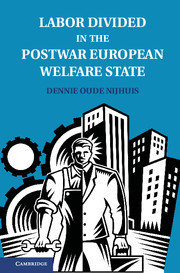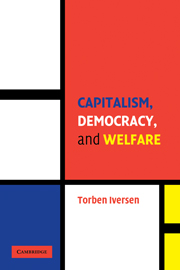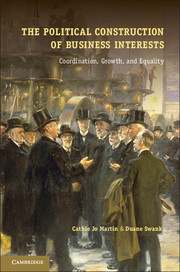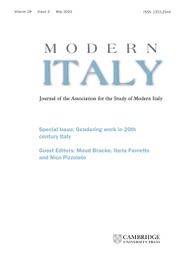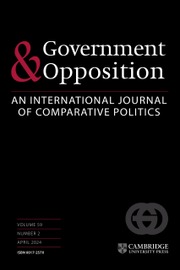Labor Divided in the Postwar European Welfare State
The Netherlands and the United Kingdom
- Author: Dennie Oude Nijhuis, Universiteit Leiden
- Date Published: June 2013
- availability: Available
- format: Hardback
- isbn: 9781107035492
Hardback
Other available formats:
eBook
Looking for an inspection copy?
Please email [email protected] to enquire about an inspection copy of this book
-
This book explains how the success of attempts to expand the boundaries of the postwar welfare state in The Netherlands and the United Kingdom depended on organized labor's willingness to support redistribution of risk and income among different groups of workers. By illuminating and explaining differences within and between labor union movements, it traces the historical origins of 'inclusive' and 'dual' welfare systems. In doing so, the book shows that labor unions can either have a profoundly conservative impact on the welfare state or act as an impelling force for progressive welfare reform. Based on an extensive range of archive material, this book explores the institutional foundations of social solidarity.
Read more- Provides a major reconsideration of organized labor's role in the development of the postwar welfare state
- Offers a comprehensive history of the British and Dutch welfare states, tackling all the major social insurance risks (old age, unemployment, sickness and disability) on a chapter-by-chapter basis
- Entirely original research based on a wealth of untapped primary resources
Reviews & endorsements
'Oude Nijhuis's book is a convincing and timely contribution to the contemporary debates on welfare state development. It highlights the gripping conflicts that, while dealing with seemingly tedious and technical features of welfare programs, reveal key differences in the welfare state preferences of labor and capital. This book opens new paths for further research.' Matthieu Leimgruber, University of Geneva
See more reviews'Oude Nijhuis's book is an essential contribution to our knowledge about welfare state formation … His most intriguing and eye-opening findings concern opposition to reform within organized labor - an issue that is virtually missing from the literature as an important empirical phenomenon or even a theoretical possibility. In Britain, most notably, it played a crucial role in stunting the welfare state. The research is entirely original, based as it is on a wealth of untapped primary sources, including archival sources from both the United Kingdom and the Netherlands. For this reason, even readers well versed in the literature on the British welfare state will be in for surprises. Those interested in the Netherlands, including Dutch readers, will find a deep trove of new knowledge about welfare state formation in that country as well.' Peter Swenson, Charlotte Marion Saden Professor of Political Science, Yale University
Customer reviews
Not yet reviewed
Be the first to review
Review was not posted due to profanity
×Product details
- Date Published: June 2013
- format: Hardback
- isbn: 9781107035492
- length: 268 pages
- dimensions: 235 x 157 x 20 mm
- weight: 0.5kg
- contains: 2 b/w illus. 9 tables
- availability: Available
Table of Contents
1. Labor and the development of the postwar welfare state
2. Labor divided
3. The development of old age pensions in The Netherlands and the United Kingdom
4. The development of unemployment insurance in The Netherlands and the United Kingdom
5. The development of disability insurance in The Netherlands and the United Kingdom
6. Union solidarity and the use of social security for early retirement purposes in The Netherlands
7. Conclusions and implications.
Sorry, this resource is locked
Please register or sign in to request access. If you are having problems accessing these resources please email [email protected]
Register Sign in» Proceed
You are now leaving the Cambridge University Press website. Your eBook purchase and download will be completed by our partner www.ebooks.com. Please see the permission section of the www.ebooks.com catalogue page for details of the print & copy limits on our eBooks.
Continue ×Are you sure you want to delete your account?
This cannot be undone.
Thank you for your feedback which will help us improve our service.
If you requested a response, we will make sure to get back to you shortly.
×
